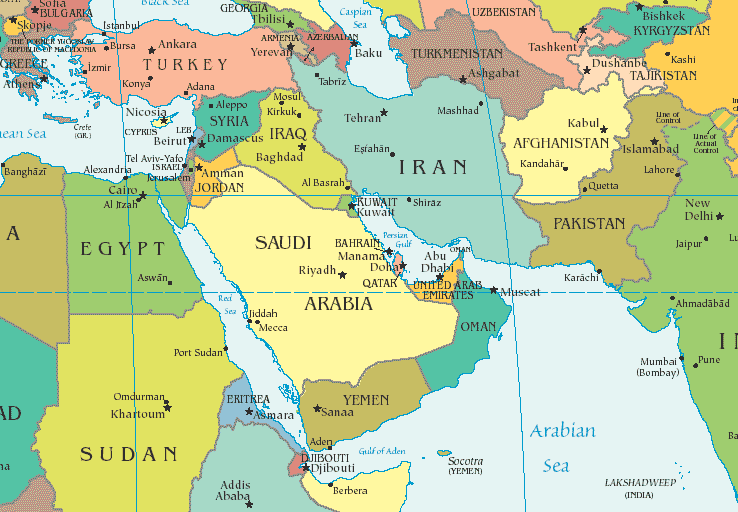A New Middle East: The Long Awaited Independence
TRANSCEND MEMBERS, 29 Apr 2019
Cristina Cabrejas-Artola – TRANSCEND Media Service
26 Apr 2019 – For centuries, whether under direct colonial regulation or independent military protection, Western powers have essentially blocked any attempts to make the Middle East a self-sufficient region despite its oil wealth and strategic trading position. Divide and rule rather than unite and lead continue to be the precedence of modern imperialism.
However, the twenty first century, an era of creation and innovation, might just be the opportunity for Middle East to rebuild its pre-imperialistic position reminiscence of its great civilization that once freed Europe of its Dark Ages.
New scientific programs are calling for the cooperation of Arab and non-Arab states in the region to focus on achieving first class research on physics, chemistry, biology and medical sciences. According to UNESCO, SESAME the first international scientific centre in the Middle East with eight member states (Turkey, Cyprus, Palestinian Authority, Jordan, Israel, Iran, Pakistan and Egypt) represent “cultural bridges between neighbouring countries, promoting mutual understanding and tolerance through international cooperation, and fostering a regional community of scientific users”.
The UAE alone is making considerable advancements in renewable energy technologies through its International Renewable Energy Agency (IRENA). Iran, Iraq, Israel, Bahrain, Egypt, Jordan, Kuwait, Oman, Qatar and Turkey are amongst the 156 member states that conform to IRENA’s objectives.
In pursuit of its economic diversification, the UAE has also invested over U$5 billion since 2015 in space technologies (Mohammed Bin Rashid Space Centre) of which forty per cent of its employees are women. This strategy not only narrows the gender gap but it aims to make the UAE the first Arab country to settle the first mission in Mars within the next 100 years in the collaboration of neighbouring states.
The UAE is establishing its focus as a cultural hub investing in internationally renowned museums such as the Louvre, Guggenheim and world-class universities like Sorbonne and NYU. The Khalifa University of Science, Technology and Research has recently combined the Masdar Institute of Science and Technology together with the Petroleum Institute into a global leading centre to facilitate research and educate world leaders in applied sciences and engineering.
According to the Global Innovation Index the Middle East continues to grow strong in the international ranking, although the gap between Israel, leading the region at number 17th, followed by the UAE at 35th, is nearly double, but still well below international average. By contrast, the performance of high per capita incomes such as Qatar 49th, Saudi Arabia 55th, and Kuwait 56th, continues to be low compared to their GDP peers. Turkey and Iran continue to climb the ranking at a vigorous pace.
The long awaiting regional union including Arab and non-Arab states (Turkey, Iran, Israel) is already showing signs of its suffocated potential. The latest scientific developments which include investment in human capital and educating new generations as global citizens, whilst maintaining their national traditions, indicate that their regional cooperation plays a key role towards a peaceful and multicultural tapestry of future developments towards the stability of the Middle East.
An independent Middle East free from Western protection is preparing to drive world leading scientific advancements as well as protecting both their strategic trading position and oil rich privileges.
A powerful Middle East gave rise to a declined Europe through scientific discoveries, providing the foundations of the industrial revolution. The Middle East is rising again, hopefully to end centuries of foreign dependency and false protection retaking the lead of further scientific advancement.
__________________________________________________
 Cristina Cabrejas-Artola is a member of the TRANSCEND Network for Peace Development Environment. She holds a Master’s degree in International Relations by Middlesex University in Dubai. Her career priorities include engaging in community programs and improving the Arab identity through sports and cultural events. She previously served as a business conflict mediator in the Middle East.
Cristina Cabrejas-Artola is a member of the TRANSCEND Network for Peace Development Environment. She holds a Master’s degree in International Relations by Middlesex University in Dubai. Her career priorities include engaging in community programs and improving the Arab identity through sports and cultural events. She previously served as a business conflict mediator in the Middle East.
Tags: International Relations, Middle East, Politics, Power, West, World
This article originally appeared on Transcend Media Service (TMS) on 29 Apr 2019.
Anticopyright: Editorials and articles originated on TMS may be freely reprinted, disseminated, translated and used as background material, provided an acknowledgement and link to the source, TMS: A New Middle East: The Long Awaited Independence, is included. Thank you.
If you enjoyed this article, please donate to TMS to join the growing list of TMS Supporters.

This work is licensed under a CC BY-NC 4.0 License.
